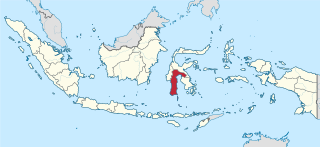
South Sulawesi is a province in the southern peninsula of Sulawesi, Indonesia. The Selayar Islands archipelago to the south of Sulawesi is also part of the province. The capital and largest city is Makassar. The province is bordered by Central Sulawesi and West Sulawesi to the north, the Gulf of Bone and Southeast Sulawesi to the east, Makassar Strait to the west, and Flores Sea to the south.
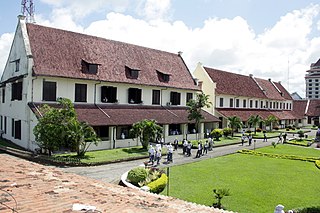
Makassar, formerly Ujung Pandang, is the capital of the Indonesian province of South Sulawesi. It is the largest city in the region of Eastern Indonesia and the country's fifth-largest urban center after Jakarta, Surabaya, Medan, and Bandung. The city is located on the southwest coast of the island of Sulawesi, facing the Makassar Strait.

Makassar Strait is a strait between the islands of Borneo and Sulawesi in Indonesia. To the north it joins the Celebes Sea, while to the south it meets the Java Sea. To the northeast, it forms the Sangkulirang Bay south of the Mangkalihat Peninsula. The strait is an important regional shipping route in Southeast Asia.
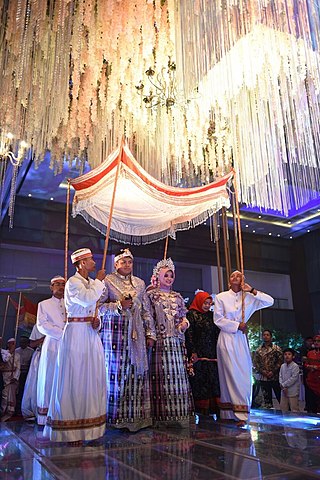
The Bugis people, also known as Buginese, are an ethnicity—the most numerous of the three major linguistic and ethnic groups of South Sulawesi, in the south-western province of Sulawesi, third-largest island of Indonesia. The Bugis in 1605 converted to Islam from Animism. The main religion embraced by the Bugis is Islam, with a small minority adhering to Christianity or a pre-Islamic indigenous belief called Tolotang.

Tana Toraja is a landlocked regency (kabupaten) of South Sulawesi Province of Indonesia, and home to the Toraja ethnic group. It covers an area of 2,054.30 km2 (793.17 sq mi) and had a population of 221,081 at the 2010 census and 280,794 at the 2020 census; the official estimate as at mid 2022 was 291,046. The local government seat is in the town of Makale, while the traditional center of Toraja culture is in Rantepao. Formerly, the Tana Toraja area covered a larger area, but on 24 June 2008 this was divided into two regencies, consisting of Tana Toraja with its capital at Makale and Toraja Utara with its capital at Rantepao.

The Torajans are an ethnic group indigenous to a mountainous region of South Sulawesi, Indonesia. Their population is approximately 1,100,000, of whom 450,000 live in the regency of Tana Toraja. Most of the population is Christian, and others are Muslim or have local animist beliefs known as aluk. The Indonesian government has recognised this animistic belief as Aluk To Dolo.

Latimojong, also known by its peak name Rantemario, is a mountain located in the province of South Sulawesi, Sulawesi, Indonesia. At 3,478 metres (11,411 ft), it is the highest mountain on the island, although some sources state Mount Rantekombola as the highest point.
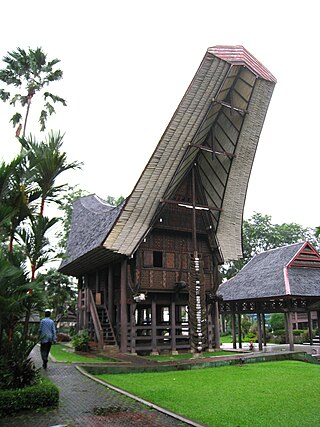
Tongkonan is the traditional ancestral house, or rumah adat of the Torajan people, in South Sulawesi, Indonesia. Tongkonan have a distinguishing boat-shaped and oversized saddleback roof. Like most of Indonesia's Austronesian-based traditional architecture, tongkonan are built on piles. The construction of tongkonan is laborious work and it is usually built with the help of all family members or friends. In the original Toraja society, only nobles had the right to build tongkonan. Commoners live in smaller and less decorated homes called banua.
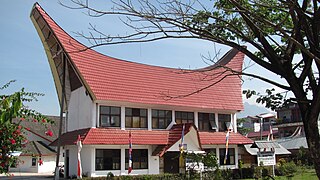
Rantepao is a town and capital of North Toraja Regency, which is known for the cultural center of Toraja ethnic group. National and regional tourism offices have developed the city as the starting point for visiting Tana Toraja, since the area was opened for tourism in the 1970s.

Polewali Mandar is one of the five regencies in West Sulawesi province of Indonesia. It borders on the regencies of Mamasa in the North, Majene in the West and Pinrang regency of South Sulawesi in the East. It covers an area of 2,074.76 km2 and had a population of 396,120 at the 2010 Census and 478,534 at the 2020 Census. The official estimate as at mid 2022 was 490,493. The regency is inhabited by various ethnic groups such as the Mandar, Buginese, Javanese and Toraja.

The Mandarese are an ethnic group in the Indonesian province of West Sulawesi in Sulawesi. The Mandar language belongs to the Northern subgroup of the South Sulawesi languages group of the Malayo-Polynesian branch of the Austronesian language family. The closest language to Mandar is the Toraja-Sa'dan language.
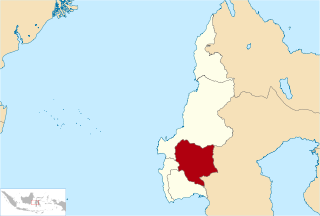
Mamasa Regency is one of the six regencies that make up the West Sulawesi Province, Indonesia, on the island of Sulawesi. It covers a land area of 3,005.88 km2. The population was 140,082 at the 2010 Census and 163,383 at the 2020 Census; the official estimate as at mid 2022 was 166,471. Its capital is the town of Mamasa. The Mamasa people - which is a sub-group of the Toraja people - form the most common ethnic group.
Pongtiku Airport is a defunct airport in Rantetayo, Tana Toraja Regency, Province South Sulawesi, Indonesia. It had a 1,300 meter runway and was served by ATR 42 and Fokker 50 aircraft. The airport was closed on 4 September 2020 with the opening of the Buntu Kunik Airport.
Taeʼ is a language spoken in South Sulawesi, Indonesia. It belongs to the Austronesian language family and is one of the languages of the ten tribes that inhabit the Tana Luwu region of South Sulawesi. The Taeʼ language is used by most of the inhabitants of the three regencies of Tana Luwu, and the city of Palopo. Taeʼ is part of the South Sulawesi group of languages. It is closely related to Toraja, and more distantly to Mandar, Massenrempulu, and Mamuju. Taeʼ is used as a lingua franca from south of the border with Buriko Wajo Regency to Malili East Luwu Regency, as well as in Tana Toraja and Massenrempulu.

North Toraja is a landlocked regency (kabupaten) of South Sulawesi Province of Indonesia, and the home of the Toraja ethnic group. The local government seat is in Rantepao which is also the center of Toraja culture. Formerly this regency was the northern part of Tana Toraja Regency, but on 24 June 2008 the northeastern 36% of the latter's area was split off to form this separate North Toraja Regency. It covers an area of 1,151.47 km2 and had a population of 216,762 at the 2010 census and 261,086 at the 2020 census; the official estimate as at mid 2022 was 268,198, comprising 136,998 males and 131,200 females.
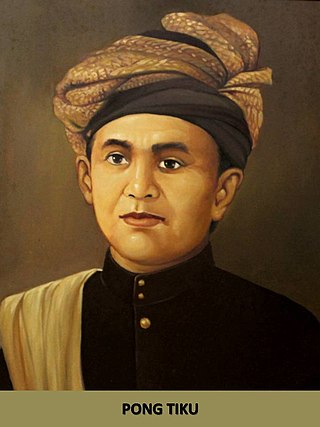
Pong Tiku, known among his Buginese allies as Ne' Baso, was a Torajan leader and guerrilla fighter who operated in southern Sulawesi, part of modern-day Indonesia.
Rev. Ishak Pamumbu Lambe was an Indonesian Torajan Christian pastor and politician. He served as a Senator in the national Regional Representative Council from 2004 to 2009. Lambe was also the former Chairman of the Toraja Church Synod Worker's Agency, a Protestant denomination headquartered in the Tana Toraja Regency of South Sulawesi, from 1992 to 2001.
The Torajan Muslims is a term for Torajan people who follow the Islam religion. Islam itself is a minority religion adhered to by Torajans. In general, the Torajan people adhere to Christianity; majority Protestant. In addition, small Torajan Muslim communities of muallaf are also found in Bontang City, East Kalimantan; a place where many Torajans migrants are found.














